2018 PMLA winners, shortlist and judges
The winners, shortlistees and judges of the 2018 Prime Minister's Literary Awards.
Judges 2018
Nonfiction and Australian history panel
Professor Lynette Russell AM (Chair)
Helen Trinca
Emeritus Professor Richard Waterhouse FRSN FAHA FASSA
Professor Greg Melleuish
Dr Sally Warhaft
Fiction and poetry panel
Professor Bronwyn Lea (Chair)
Dr James Ley
Susan Wyndham
Associate Professor Sarah Holland-Batt
Kathy Shand (2017 & 2018)
Children’s and young adult literature panel
Professor Margot Hillel OAM (Chair)
Joy Lawn
Margrete Lamond (2017 & 2019)
Professor Robyn Ewing AM
Sue Whiting
Kerry Neary (2018)
Australian history
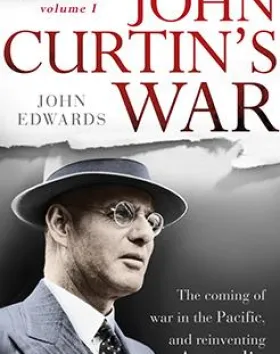
WINNER: John Curtin’s War: The coming of war in the Pacific, and reinventing Australia, volume 1 – John Edwards
John Curtin's War: The coming of war in the Pacific, and reinventing Australia, volume 1
WINNER
Shortlist year: 2018
Shortlist category: Australian history
Published by: Penguin Random House
John Curtin became Australia's Prime Minister eight weeks before Japan launched war in the Pacific. Curtin's struggle for power against Joe Lyons and Bob Menzies, his dramatic use of it when he took office in October 1941, and his determination to be heard in Washington and London as Japan advanced, is a political epic unmatched in Australian experience. John Edwards' vivid, landmark biography places Curtin as a man of his times, puzzling through the immense changes in Australia and its region released by the mighty shock of the Pacific War.
About the author
John Edwards
John Edwards has written six non-fiction books, including the bestselling Keating: The Inside Story. He is a non-resident fellow at the Lowy Institute and adjunct professor at the John Curtin Institute of Public Policy at Curtin University. He has been a member of the board of the Reserve Bank of Australia, Chief Economist for HSBC Bank in Australia and New Zealand, and was a senior economic adviser for Treasurer and then Prime Minister Paul Keating.
Judges’ comments
This fluently written and intelligently argued book is written for a wide audience. This is a rich political biography, which carefully maps the social and political contexts out of which Curtin emerged to become leader of the Labor Party and then Prime Minister. Edwards carefully recreates the climate of fear and uncertainty that increased in intensity as the international outlook became increasingly fragile, especially in late 1941. In early 1942, Curtin, like most Australians, came to view invasion no longer as a possibility but rather as a probability. This book is not a mere biography of Curtin, as Edwards demonstrates that his actions and achievements can only be understood within the tangled web of national politics and international events. The book maps the quickly changing relations with Britain and the United States, as Curtin determined that national security depended on alliance with America. The culmination of 30 years of research and reflection, this book constitutes a major contribution to our understanding of the history of a major Australian political figure, Australian political culture, and of the nation's continuing quest for full independence.

The Enigmatic Mr Deakin – Judith Brett
The Enigmatic Mr Deakin
Shortlist year: 2018
Shortlist category: Australian history
Published by: Text Publishing
Alfred Deakin—scholar, spiritualist, prime minister—was instrumental in creating modern Australia. In the first biography of Deakin in more than half a century, the acclaimed political historian Judith Brett deftly weaves together his public, private and family lives. She brings out from behind the image of a worthy, bearded father of federation the principled and passionate, gifted and eccentric figure whose legacy continues to shape the contours of the nation's politics.
About the author
Judith Brett
Judith Brett is the award-winning author of Robert Menzies Forgotten People, Emeritus Professor of politics at La Trobe University and one of Australia's leading political thinkers. She contributes regularly to the Monthly and has written three Quarterly Essays.
Judges’ comments
This is the first book to bring together the spiritual, political and personal life of one of Australia's most significant politicians—Alfred Deakin. As Brett deftly explores and weaves these strands together we begin to understand Alfred Deakin his motivations and indeed his enigmatic qualities. This is a psychological study of Australia's former Prime Minister. Beginning with his Melburnian upbringing Brett shows how his social and familial context shaped him. The city of Melbourne of the period is revealed as crucial to how we are to comprehend and understand Deakin. Brett is a fine writer, and the text displays her curiosity and her depth of knowledge. This is a comprehensive work which will stand as a definitive source on Alfred Deakin.
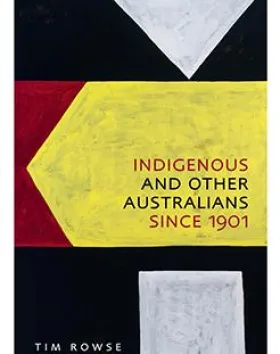
Indigenous and Other Australians since 1901 – Tim Rowse
Indigenous and Other Australians since 1901
Shortlist year: 2018
Shortlist category: Australian history
Published by: NewSouth Publishing
Not 'dying out' as predicted, Aboriginal numbers recovered and—along with Torres Strait Islanders—they became an articulate presence, aggrieved at colonial authority's interventions into family life and continuing dispossession. This book narrates their recovery—not only in numbers but in cultural confidence and critical self-awareness. Pointing to Indigenous leaders, it also reassesses the contribution of government and mission 'protection' policies and the revised definitions of 'Aboriginal'. Rowse explains why Australia has conceded a large Indigenous Land and Sea Estate, and argues that the crisis in 'self-determination' has been fuelled by Indigenous critique of the selves that they have become.
About the author
Tim Rowse
Tim Rowse has been writing on Australian Indigenous affairs since the early 1980s and is one Australia's most significant scholars of Indigenous Studies. He worked for many years at the Menzies School for Health Research in Alice Springs. He has also taught on this subject at the ANU, Western Sydney University and Harvard. Widely published, Tim's last book is Rethinking Social Justice: from 'peoples to 'populations' (2012).
Judges’ comments
This is an ambitious comprehensive book that deals with the complexity of European policies and attitudes toward Aboriginal people, from the rural north and urban southern Australia. It reassesses the contribution of government and mission 'protection' policies and explores the processes which resulted in revised definitions of 'Aboriginal'. This is a solid and fresh work focussing on the 20th century, and challenges long held views as it revisits and reanalyses previous research. In this important book Rowse takes a deep look into Australian history, to understand the complexities of the interactions between Aboriginal people, the government and missionaries. He argues for the complexity of Indigenous culture, which still eludes the understandings of Europeans. This is a brave, challenging and revealing book.

Beautiful Balts – Jayne Persian
Beautiful Balts
Shortlist year: 2018
Shortlist category: Australian history
Published by: NewSouth Publishing
170,000 displaced persons arrived in Australia between 1947 and 1952. Australia's first immigration minister, Arthur Calwell, scoured post-war Europe for refugees, displaced persons he characterised as 'Beautiful Balts'. Amid the hierarchies of the White Australia Policy, the tensions of the Cold War and the national need for labour, these people would transform not only Australia's immigration policy, but the country itself. Beautiful Balts tells the extraordinary story of these people. It traces their journey from the camps of Europe after the Second World War to a new life in a land of opportunity where prejudice, parochialism, and anti-communism were rife.
About the author
Jayne Persian
Jayne Persian is a historian of modern Australia and has a PhD in history from the University of Sydney. Her research focuses on the political, cultural and social history of the 170,000 'Displaced Persons'—predominantly Central and Eastern Europeans—who arrived in Australia as International Refugee Organisation (IRO) sponsored refugees. She is currently a lecturer in history at the University of Southern Queensland, Toowoomba.
Judges’ comments
Beautiful Balts is set in the post Second World War period, between 1947 and 1952, when 170,000 displaced persons arrived in Australia from Eastern Europe. This book puts into context a long-neglected subject of Australian history. Persian provides a new perspective on the White Australia Policy that still haunts our nation. Beautiful Balts demonstrates how important it is to comprehend our immigration history in order to be able to understand Australia today. One of its strengths is the revelations of how diverse these immigrants were, ethnically as well as politically. It provides a detailed picture of their diverse backgrounds and the original context. The book is a truthful, honest history that provides a picture of the time and reflection on current policies.
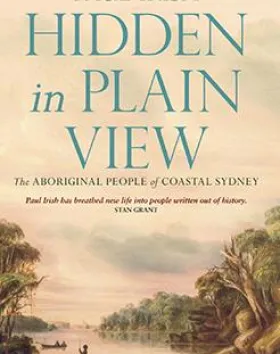
Hidden in Plain View – Paul Irish
Hidden in Plain View
Shortlist year: 2018
Shortlist category: Australian history
Published by: NewSouth Publishing
Aboriginal people are prominent in accounts of early colonial Sydney, yet we skip a century as they disappear from the historical record, re-emerging early in the 20th century. What happened to Sydney's Indigenous people between the devastating impact of white settlement and increased government intervention a century later? This book shows that Aboriginal people did not disappear. They may have been ignored in colonial narratives but maintained a strong bond with the coast and its resources. This original and important book tells this powerful story through individuals, and brings a poorly understood period of Sydney's shared history back into view.
About the author
Paul Irish
Paul Irish is an archaeologist and historian who has spent the past 15 years working with local Aboriginal people on projects about Sydney's Aboriginal archaeology and history. He has worked on the presentation of Aboriginal history at Sydney Living Museums, and has also contributed to the Dictionary of Sydney and the City of Sydney Barani website. He regularly lectures on Aboriginal history and archaeology at the University of New South Wales and Sydney University.
Judges’ comments
Hidden in Plain View is an important book that is likely to change people's views on Indigenous people. It carefully maps relations between the European and Indigenous inhabitants over a 100-year period, in the process demonstrating how individuals from both sides developed strategies to ensure Aboriginal survival. Irish is a talented historian who cleverly integrates archaeological material to recreate the lives and culture of Sydney's Indigenous communities. This is an empirically rich text built on meticulous research and previously uncovered resources. The book reads as both imaginative and creative. This is a stunning local history, the kind which is likely to prove exemplary for other local studies across the nation. The inclusion of images both nineteenth century and contemporary adds immensely to our understandings of the lives of Sydney's Indigenous inhabitants.
Fiction

WINNER: Border Districts – Gerald Murnane
Border Districts
WINNER
Shortlist year: 2018
Shortlist category: Fiction
Published by: Giramondo Publishing
Conceived as Gerald Murnane's last work of fiction, Border Districts was written after the author moved from Melbourne to a small town on the western edge of the Wimmera Plains, near the border with South Australia. The narrator of this fiction has made a similar move, from a capital city to a remote town in the border country, where he intends to spend the last years of his life. It is a time for exploring the enduring elements of his experience, as these exist in his mind, not as an integral landscape now, but as image-fragments.
About the author
Gerald Murnane
Gerald Murnane was born in Melbourne in 1939. He is the author of 11 works of fiction, including Tamarisk Row, The Plains, Inland, Barley Patch, A History of Books, A Million Windows, and Border Districts, and a collection of essays, Invisible Yet Enduring Lilacs. He is a recipient of an Emeritus Fellowship from the Australia Council, the Patrick White Literary Award, the Melbourne Prize for Literature, the Adelaide Festival Literature Award for Innovation and the Victorian Premier's Literary Award.
Judges’ comments
In Border Districts, Gerald Murnane has distilled the various elements of his inimitable literary sensibility into a perfectly formed short work. The logic of this unique book is associative rather than narrative. Styled as a 'report' on the images that strike the mind of its narrator, it has him relating scenes from his childhood and adolescence, reflecting on the books he has read, remembering old acquaintances, and taking in the landscape of the small borderland town where he has come to live. The narrative is an exquisite prism of introspection, in which a life's experiences are carefully ordered and transformed into art by virtue of the patterns they come to form in the mind and the profoundly evocative qualities they have acquired. Rendered in crystalline prose and touched with an elegiac pathos, Border Districts is the crowning achievement of a singular literary career.

First Person – Richard Flanagan
First Person
Shortlist year: 2018
Shortlist category: Fiction
Published by: Penguin Random House
A young and penniless writer, Kif Kehlmann, is rung in the middle of the night by the notorious criminal, Siegfried Heidl. About to go to trial for defrauding the banks of $700 million, Heidl proposes a deal: $10,000 for Kehlmann to ghost write his memoir in six weeks. As he writes, Kehlmann begins to fear that he is being corrupted, he becomes ever more unsure if he is ghost writing a memoir, or if Heidl is rewriting him. Everything that was certain grows uncertain as he begins to wonder: who is Siegfried Heidl—and who is Kif Kehlmann?
About the author
Richard Flanagan
Richard Flanagan was born in Tasmania in 1961. His novels Death of a River Guide, The Sound of One Hand Clapping, Gould's Book of Fish, The Unknown Terrorist, Wanting and The Narrow Road to the Deep North have received numerous honours and are published in 42 countries. He won the Man Booker Prize for The Narrow Road to the Deep North in 2014.
Judges’ comments
First Person by Richard Flanagan is a powerful and comic examination of the life of a writer. Flanagan takes us inside the mind of the writer as he tries to understand his craft, his subject and the world in which he writes. The author's alter ego, Kif Kehlmann, is commissioned to ghost write the memoir of a con man and the intersection of his life with that of his subject provides the momentum for an exploration of morality, capitalism and contemporary times. The loss of moral certitude in the face of financial reward looms large. Flanagan takes it all on in this compellingly biting satire.

Taboo – Kim Scott
Taboo
Shortlist year: 2018
Shortlist category: Fiction
Published by: Pan Macmillan
Taboo tells the story of a group of Noongar people who revisit, for the first time in many decades, a taboo place: the site of a massacre that followed the assassination, by these Noongar's descendants, of a white man who had stolen a black woman. They come at the invitation of Dan Horton, the elderly owner of the farm on which the massacres unfolded. He hopes that by hosting the group he will satisfy his wife's dying wishes and cleanse some moral stain from the ground on which he and his family have lived for generations.
About the author
Kim Scott
Kim Scott is a multi-award winning novelist. Benang was the first novel by an Indigenous writer to win the Miles Franklin Award and in 2011 That Deadman Dance also won the Miles Franklin Award, among many other honours. Proud to be one among those who call themselves Noongar, Scott is founder and chair of the Wirlomin Noongar Language and Story Project, which has published a number of bilingual picture books. He received an Australian Centenary Medal and was 2012 West Australian of the Year. He is currently Professor of Writing in the School of Media, Culture and Creative Arts at Curtin University.
Judges’ comments
In his ambitious third novel, Taboo, Kim Scott attempts a fictional act of reconciliation on West Australian land scarred by a historic massacre of Indigenous people. Members of the Noongar community return to honour the ghosts of their dead ancestors and to meet land owners who may still wish them ill. At the centre of the story Tilly, a teen-age girl, seeks to understand her complicated heritage. Scott writes with urgency about his people's need to reclaim their land, history and language while recognising their place in contemporary Australia. The novel is a skillful blend of fable and thriller, Dreamtime magic and Canterbury Tales road trip. Goodwill and brutality wrestle for dominance among a band of vivid and sometimes comic individuals who represent the complexity of human nature. Taboo is a haunting, original and important contribution to Australian literature.

The Life To Come – Michelle de Kretser
The Life To Come
Shortlist year: 2018
Shortlist category: Fiction
Published by: Allen & Unwin
Set in Sydney, Paris and Sri Lanka, The Life to Come is a mesmerising novel about the stories we tell and don't tell ourselves as individuals, as societies and as nations. Pippa is a writer who longs for success. Celeste tries to convince herself that her feelings for her married lover are reciprocated. Ash makes strategic use of his childhood in Sri Lanka but blots out the memory of a tragedy from that time. Driven by riveting stories and unforgettable characters, here is a dazzling meditation on intimacy, loneliness and our flawed perception of other people.
About the author
Michelle de Kretser
Michelle de Kretser was born in Sri Lanka and emigrated to Australia when she was 14. Educated in Melbourne and Paris, Michelle has worked as a university tutor, an editor and book reviewer. She is the author of The Rose Grower, The Hamilton Case, and The Lost Dog, which won a number of awards, including the 2008 ALS Gold Medal and longlisted for the Man Booker Prize. Her last novel, Questions of Travel, received 14 honours, including winning the 2013 Miles Franklin Literary Award and the Prime Minister's Literary Award for fiction.
Judges’ comments
The Life to Come by Michelle de Kretser is a sophisticated and cosmopolitan novel about lives displaced by trauma and travel. Five sections set in Sydney, Paris and Sri Lanka follow an ensemble of characters loosely connected by the striving Australian writer, Pippa Reynolds. The intricate narrative observes contemporary urban life at both macro and micro levels, from the politics of colonialism and immigration to the faux pas of tourists and the smell of a doomed spice shop in Sydney's inner-west. De Kretser is a perfectionist in her crafting of precise sentences, exquisite imagery and subtly shifting perspectives. Her laser-beam satire sees through pretension and ignorance, while paying respect to the lost and lonely. The Life to Come portrays Australia's multi-faceted identity with tremendous wit and insight.
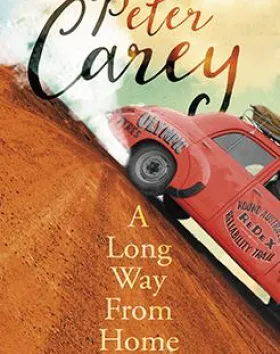
A Long Way From Home – Peter Carey
A Long Way From Home
Shortlist year: 2018
Shortlist category: Fiction
Published by: Penguin Random House
Irene Bobs loves fast driving. Her husband is the best car salesman in western Victoria. Together they enter the Redex Trial, a brutal race around the ancient continent over roads no car will ever quite survive. This thrilling, high-speed story is often funny and always a page-turner, even as you learn a history these characters never knew themselves. Set in the 1950s amid the consequences of the age of empires, this brilliantly vivid and lively novel reminds us how Europeans took possession of a timeless culture—the high purpose they invented and the crimes they committed along the way.
About the author
Peter Carey
Peter Carey was born in Bacchus Marsh, Victoria, and now lives in New York. He is the author of fourteen novels (including one for children), two volumes of short stories, and two books on travel. Amongst other prizes, Carey has won the Man Booker Prize twice (for Oscar and Lucinda and True History of the Kelly Gang), the Commonwealth Writers' Prize twice (for Jack Maggs and True History of the Kelly Gang), and the Miles Franklin Literary Award three times (for Bliss, Oscar and Lucinda and Jack Maggs).
Judges’ comments
Peter Carey's A Long Way From Home heralds the novelist's return to the fertile stomping grounds of Bacchus Marsh, his childhood home and frequent literary touchstone. Carey's rollicking, technicolour imagination is at full throttle in his descriptions of the Redex Trial: a bone-rattling and perilous trip around Australia that brings his three companions into contact with the vast continent in a way they have never experienced before. But the resulting journey becomes something far larger, stranger and more powerful than a car race across Australia's plains: it morphs into an interrogation of what home is, what it can mean, and how history can rarely be settled by maps or narratives found in books. A Long Way From Home shows Carey in high form, balancing the antic and the deadly serious on a knife's edge, and marks a powerful contribution to his oeuvre.
Poetry
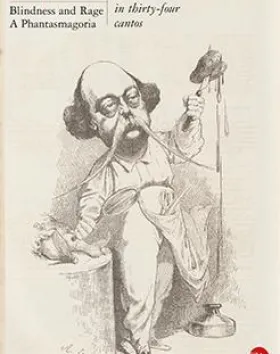
WINNER: Blindness and Rage: A Phantasmagoria – Brian Castro
Blindness and Rage: A Phantasmagoria
WINNER
Shortlist year: 2018
Shortlist category: Poetry
Published by: Giramondo Publishing
Suffering from a fatal disease, Lucien Gracq travels to Paris to complete the epic poem he is writing. He joins a secret writers' society, le club des fugitifs, that guarantees to publish the work of its members anonymously, thus relieving them of the burdens of life and the disappointments of authorship. Gracq finds himself crossing paths with a parade of masters of identity, connoisseurs of eroticism and theorists of game. He flees from the deathly allure of the Fugitives—but it may be too late. Blindness and Rage throws down a challenge to the limits of the novel form.
About the author
Brian Castro
Brian Castro is the author of the prize-winning Australian classic Shanghai Dancing and recipient of the 2014 Patrick White Literary Award. His recent novels include The Garden Book and The Bath Fugues, both shortlisted for the Miles Franklin Literary Award, and Street to Street, loosely based on the life of the poet Christopher Brennan. He is Professor of creative writing at Adelaide University.
Judges’ comments
Blindness and Rage is a verse novel—composed of thirty-four cantos—notable for its mordant wit, its rich allusiveness and the invigorating fluency of its verse. Characterised by its author as a 'phantasmagoria', it describes the adventures of a terminally ill poet from Adelaide named Lucien Gracq, as he undertakes a final journey through the seamy underbelly of the literary world in the hope of realising his desire to complete his own epic poem. Blindness and Rage displays the formal inventiveness that has long been a feature of Brian Castro's work, but it is also an extremely funny book, packed with jokes and wordplay that wrings considerable delight from Gracq's gloomy outlook. Blindness and Rage is a wicked satire on pretension and futility, a poem about ambition and literary endeavour as paths to frustration and failure, but it is itself a poem that manages to avoid these pitfalls and achieve a brilliant success.
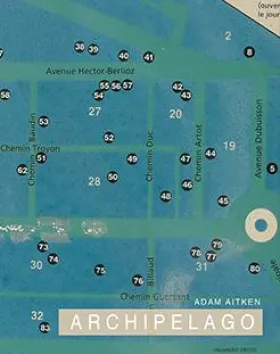
Archipelago – Adam Aitken
Archipelago
Shortlist year: 2018
Shortlist category: Poetry
Published by: Vagabond Press
His most personal poetry to date, Adam Aitken's Archipelago is entirely preoccupied with the experience of living and marrying in France. Much of it written while resident at the Keesing Studio in Paris, and then in the south during a seriously cold spring, many of the poems deal with art, romantic and modernist writing and writers, and concepts of nostalgia, spirituality, revolution and resistance.
About the author
Adam Aitken
Adam Aitken is a London-born teacher and writer who migrated to Sydney after spending his early childhood in Thailand and Malaysia. He has published five full length collections of poetry. In One House, was nominated in The Australian as one of the best poetry collections for 1996; Romeo and Juliet in Subtitles was shortlisted for the John Bray South Australian Literary Festival Award, and runner-up for The Age Book of the year poetry prize; Eighth Habitation shortlisted for the same award in 2010, and most recently Archipelago, shortlisted for the Kenneth Slessor Award for 2018.
Judges’ comments
In Adam Aitken's Archipelago, the poet is 'alive and speeding' in his partner's 'tiny French car' through the South of France. 'If you could buy the wind and store it forever,' he enthuses, 'you would'. Archipelago is a love poem not only to France—its light, food, poets, and aesthetics—but also to Nella, the poet's partner, whom he wishes to marry 'again and again'. Aitken is intent on constructing his own textual landscape: 'Paris, in my version,' he writes, is 'spireless' with 'more rotundas'. Likewise, his version of southern France is punctuated less by lavender and more by 'rusted cans of tuna, some local brand' and 'crushed plastic shot-gun cartridges'. Notre-Dame is a 'stone machine of anti-gravity' and the Seine as 'a limpid green gutter / in which the stars will shine', but these images only compel Aitken to delve deeper into bigger issues, often surprising himself along the way. Archipelago is a striking collection that finds Aitken at his splendid best.
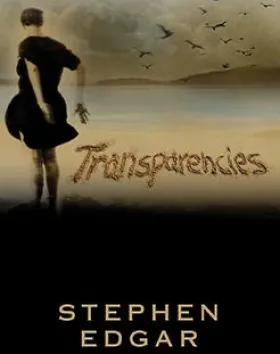
Transparencies – Stephen Edgar
Transparencies
Shortlist year: 2018
Shortlist category: Poetry
Published by: Black Pepper
Stephen Edgar's nimble-footed Transparencies extends his exploration of the world's visual aspect, both in itself and as a screen for the mind's projections. He questions whether reality coincides always with its appearances. The transparencies of the title are both the day lit images of the natural world and the occasions they offer us to look through them, or into the world within this one. Edgar's poems look out and reach in. They probe yet have an exquisite ear. As well as moving poems on his late mother, Transparencies has many pleasures like waiting for the delayed rhyme on 'David Attenborough'.
About the author
Stephen Edgar
Stephen Edgar was born in 1951 in Sydney, where he grew up. His collections are: Queuing for the Mudd Club, Ancient Music, Corrupted Treasures, Where the Trees Were, Lost in the Foreground, Other Summers, History of the Day, Eldershaw (which was shortlisted for the Queensland Literary Award 2013, co-winner of the Colin Roderick Award 2013 and shortlisted for the Prime Minister's Literary Awards 2014) and Exhibits of The Sun (shortlisted for the Prime Minister's Literary Awards 2015).
Judges’ comments
Stephen Edgar's Transparencies is a commanding demonstration of the poet's signature formal control. In poems that follow strict metrical and stanzaic patterning of his own invention, Edgar demonstrates that formal verse can house great originality and surprise, often through his comic and unexpected detonations of rhyme. But the poems here move beyond mere technical accomplishment into the emotive and tender territory of grief and loss. His self-imposed constraints provide a moving frame through which we see a son's heartache at a mother with 'only one day' remaining to her, 'waiting through the weight of each dead minute'. The poems also rove elsewhere—through film and literature, art and place—always questioning the angles of perception and whether we can trust what we see. This scepticism is frequently turned inward, and we are presented with complex instances of self-portraiture, where the poet looks into the mirror and finds a mortal and fragile subject: 'the holder / of an expiring lease'. Transparencies demonstrates that the immense control Edgar has developed across his body of work and how it has matured into fluid grace.

Domestic Interior – Fiona Wright
Domestic Interior
Shortlist year: 2018
Shortlist category: Poetry
Published by: Giramondo Publishing
Anxiety lurks in domestic spaces, inhabiting the most ordinary objects, like a drillbit or a phone charger, drawing our attention to the bruised body and its projecting parts. The elements of language take on new intensity in a series of 'overheard' poems fraught with their speakers' vulnerability and their attempts at resolution. Wright walks us through the places where this drama unfolds, in shopping centres, cafes, hospitals and bedrooms, in the inner-city and south-west suburbs of Sydney, presenting them as sites of love as well as sadness, and succour and strength as well as unease.
About the author
Fiona Wright
Fiona Wright is a writer, editor and critic from Sydney. Her book of essays Small Acts of Disappearance: Essays on Hunger won the 2016 Nita B. Kibble Award for Women Writers, the Queensland Literary Award for non-fiction, and was shortlisted for the Stella Prize and the NSW Premier's Douglas Stewart Award. Her first poetry collection, Knuckled, won the 2012 Dame Mary Gilmore Award. She has recently completed a PhD at Western Sydney University's Writing & Society Research Centre. Her poems and essays have been published in The Australian, and in the literary journals Meanjin, Island, Overland, The Lifted Brow, Seizure and HEAT.
Judges’ comments
Domestic Interior by Fiona Wright invites us to observe Australian life through the lens of the suburban domestic. Wright's aim is not to replicate notions of domestic space as one that inhibits its female occupants, but rather one that, if properly calibrated to the moment, is copious in its catalogue of energies. Wright's meditation on domestic interiors extends to the interiority of the self as she turns her gaze outdoors. 'Sometimes a reorientation', she says, 'presents another face to the sea'. In 'Winter Pastoral' she juxtaposes the concrete imagery of road kill—'dead wombats bouldered / and wild-eyed wallabies / vaulted the boundary fence'—against the unexpected marvel of the sky: 'I'd forgotten how stars giddy / out here,' she says. Finding herself in Berlin, the poet is disoriented but enthralled inside a foreign language: a woman on a train hands her 'the word Pfingsrosen, / a peony plucked from her own front yard'. The poet later recalls 'a white lace dress. We're drinking gin,' she says, 'muddled with cherries'. Intoxicating in its imagery, Domestic Interior affirms language, even its smallest components, as the prime constituents of our inner world.

Chatelaine – Bonny Cassidy
Chatelaine
Shortlist year: 2018
Shortlist category: Poetry
Published by: Giramondo Publishing
Chatelaine is a collection of poems whose personae, like a family portrait, resemble one another in foxed, latent ways. Its voices stalk across time and space, inhabiting genres of riddle, fragment, confession, lyric and ekphrasis, returning to images of metamorphosis and possession. A chatelaine is the mistress of a castle or ancestral household, but in this collection's elegant but unruly house mysterious transformations occur, dreams project strange apparitions and landscapes, words twist and turn, references to tradition go hand-in-hand with sci-fi special effects and cinematic staging. The poems ask: who does this place belong to? Who comes as a visitor?
About the author
Bonny Cassidy
Bonny Cassidy is a poet, essayist and critic, whose first collection, Certain Fathoms, was shortlisted for the 2012 Western Australian Premier's Poetry Award. Her poetry has featured in the John Leonard Press Young Poets Anthology, and in Black Inc's Best Australian Poems four years running. She is the recipient of an Asialink literary fellowship, a Marten Bequest Travelling Scholarship and the Australian Poetry Ireland Tour fellowship.
Judges’ comments
Chatelaine by Bonny Cassidy puts the word centre stage. Cassidy's poetry is rooted in her investigations of language, an interest in a feminist consciousness, and her capacity for renewing meaning as a virtual space of desire. The reader enters a poetic world of 'noisy secrets' in which 'riddles multiply' to generate a reading experience in which it is more rewarding to ask than to answer: 'Question nearly everything, read it again,' the poems command. 'Why do you do this?' and 'who else owns your body?' From pilgrims to daleks, a shimmering heath to a basement carpark, Cassidy tunnels in opposite directions—accelerating through time, dreams, myth and person—to stake a territory beyond the language of the familiar. The poems in Chatelaine coalesce in a dream in which Cassidy renovates the ancestral household into an audacious new architecture of meaning.
Children's literature

WINNER: Pea Pod Lullaby – Glenda Millard and Stephen Michael King
Pea Pod Lullaby
WINNER
Shortlist year: 2018
Shortlist category: Children's literature
Published by: Allen & Unwin
Words sing over the pictures in this evocative story: a beautiful lullaby about what we can be for each other. A mother and baby, a boy and a dog run for their lives. A little boat carries them across the sea. A polar bear, too, has come adrift. When will they find land? Where will they find friends? Who will welcome them in? The Pea Pod Lullaby is an inspiring and timely story of courage, endurance, and hope... for a world in which we can reach out and embrace one another.
About the author
Glenda Millard
Glenda Millard is a highly respected author who writes for children of all ages. Her novel A Small Free Kiss in the Dark was the winner of the 2009 Queensland Premier's Award for young adults, Honour Book in the 2010 Children's Book Council of Australia (CBCA) awards for older readers, shortlisted for the 2010 NSW Premier's Literary Awards and included on the Honour List for the 2012 International Board on Books for Young People. Books from her popular Kingdom of Silk series have also received individual awards. Her novel, The Novice, was chosen for a White Raven Award in 2006. Glenda has also written many picture books, including The Duck and the Darklings, illustrated by Stephen Michael King, which was winner of the 2016 WA Premier's Literary Awards for children's books and shortlisted in the 2015 CBCA awards. In 2017, her young adult book, the Stars of Oktober Bend was shortlisted for the Prime Minister's Literary Awards.
About the author
Stephen Michael King
Stephen Michael King is an internationally bestselling illustrator who has illustrated over eighty books. He's been nominated for, and won sometimes, a whole bunch of awards. His books have been drawn in, chewed and thoroughly enjoyed throughout the world. He has also written over fifteen books. Books he has both written and illustrated include Milli, Jack and the Dancing Cat, Emily Loves to Bounce, Mutt Dog, You and Leaf. Several of his books have been shortlisted by the CBCA, and they frequently appear in children's choice awards. Stephen lives with his family on a coastal island in the Manning Valley of New South Wales (NSW).
This book grew from a poem Glenda wrote when Stephen and Glenda were preparing their contribution to the Hush Treasure Book for the Hush Foundation. They developed the words and pictures for this story together when Stephen was doing a residency at Manning Regional Art Gallery
Judges’ comments
'I am the lullaby/ you are the melody/ sing me'.
These opening words introduce Pea Pod Lullaby, a gentle but thought-provoking hymn to how we should live in harmony, connecting with each other and caring for our world. Glenda Millard and Stephen Michael King both acknowledge that the original idea for the lullaby was inspired by a Leonard Cohen song, and conceived when contributing to a publication to raise money for the Royal Melbourne Children's Hospital Children's Cancer Centre.
This story is sadly all too familiar today: a mother and her children, one a newborn, and their dog flee a war-ravaged land by boat. They journey over the sea to a new beginning. Along the way they welcome a lost polar bear ironically adrift on an empty refrigerator. Deeply evocative, the story can be interpreted as a metaphor for the many difficult and dangerous journeys we might need to take during a lifetime. Themes of courage and resilience are reflected alongside the need to trust and support one another and hold out hope against seemingly insurmountable odds.
This picture book is a seamless collaboration between words and image: beautifully crafted, carefully positioned minimalist couplets overlay the rich and lyrical watercolours that convey much of the narrative. Each image uses colour and light skilfully and each opening depicts different possibilities that can be explored at length and revisited many times. Other literary journeys are alluded to (for example, The Owl and the Pussycat). Interestingly, although we might initially assume it is the mother who is singing to her baby, the 'you' consistently supports or nurtures the 'I' suggesting it is also the baby's lullaby ('I am the small green pea you are the tender pod; I am the diving kite you are the bow-tied tail'). At the same time the choice of 'you' ensures the reader is directly addressed throughout this meditation. While outwardly calm and reflective, this haunting and inspirational picture book is a deeply layered, eloquent exploration of different kinds of love, including the love for a mother and her child, care for the creatures who share our world and deep respect and concern for our environment.

Storm Whale – Sarah Brennan and Jane Tanner
Storm Whale
Shortlist year: 2018
Shortlist category: Children's literature
Published by: Allen & Unwin
A captivating and beautifully illustrated story about three sisters who find a stranded whale on the beach. With a powerful, poetic text, wonderful to read aloud, and illustrations full of life and movement, Storm Whale celebrates the majesty and vulnerability of nature and our place in it.
About the author
Sarah Brennan
Sarah Brennan is the Hong Kong-based, Tasmanian-born author and publisher of the best-selling Chinese Calendar Tales as well as the hugely popular Dirty Story series for kids. Her books have regularly appeared on bestseller lists in Hong Kong, where at one point, two of her titles outsold the (then) latest J.K.Rowling and Stephenie Meyer titles for 6 weeks running! Two titles have previously been long-listed for Singapore's Red Dot Children's Book Awards, and her 2015 title, The Tale of Rodney Ram, was short-listed for the Golden Dragon Book Awards 2016.
About the author
Jane Tanner
Jane Tanner has a fine art and teaching background and began illustrating picture books full-time in 1984. She loves working for children and drawing their attention to the natural world in all its awe and wonder. She is the acclaimed illustrator of the best-selling picture books There's a Sea in my Bedroom, The Fisherman and the Theefyspray, and The Soldier's Gift. She is the author and illustrator of Playmates, Isabella's Secret, Ride with Me, Just Jack, and Love from Grandma. She has won or been shortlisted for many prestigious awards, including the Children's Book Council of Australia (CBCA) Book of the Year Awards.
Judges’ comments
Cleverly expressed in verse, Storm Whale dramatically tells the story of three young sisters who, on a wet and windy day, find a stranded whale on the beach. The children spend the day tipping buckets of water over the whale and trying, unsuccessfully, to get it to move. The girls leave the beach at dusk as a storm comes in, broken-hearted at their lack of success. Next morning, however, this turns to joy as they find the storm has been the whale's friend, sweeping it back out to sea. This is a book about caring for the natural world and evokes our compassion without the whale being anthropomorphised.
The verse form works very well for this story; it almost mimics a sea shanty, songs that were often used to provide rhythm for tasks on sailing ships. Here too, the rhyming couplets seem to evoke the rhythmic bucketing of the water over the whale. There is richness in the text, which uses wonderful imagery to conjure up scenes such as the 'wrack and wreck' strewn across the beach after the storm.
The carefully constructed written text is wonderfully enhanced and complemented by the illustrations. These are full of emotion, colour and movement. They are realistic, almost brutal at times and add to the drama of the tale. The colour palette, as well as reflecting the changes in the weather, also evokes the girls' moods: grey as they trudge home believing they have failed in their task; joyful blues and greens when they find the whale has gone. There is a sense of wonder conveyed in that particular illustration which the viewer shares, placed as we are behind the girls. The illustrations also portray a loving relationship between the siblings and a real sense of family as they and their mother huddle by firelight through the storm. The story covers a short time frame but runs through a gamut of emotions and beautifully constructs a beach holiday with a difference.
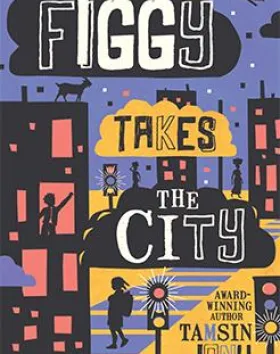
Figgy Takes the City – Tamsin Janu
Figgy Takes the City
Shortlist year: 2018
Shortlist category: Children's literature
Published by: Scholastic Australia
This is the third and final story in the award-winning Figgy series. Both Nana and Figgy, receive scholarships to attend the Hope College in Ghana's big city, Accra. Figgy and Nana will have to leave behind the village and family they love, meet lots of new people and learn new things. Figgy does not want to go, but Grandma Ama says she must. But Nana begins acting strange and he will not tell Figgy what he is doing when he disappears from school on the weekends.
About the author
Tamsin Janu
Tamsin Janu was born and raised in Sydney. When she is not writing, Tamsin is studying Law. Her first novel, Figgy in the World, was written after a three-month stay in Ghana in 2009. Many of the places and the children she met there inspired her novels. She has won or been shortlisted for several literature awards.
Judges’ comments
Fans will be aware that this is the third tale about the ebullient Figgy and her exuberant family, and their experiences in their home country of Ghana. Like its predecessors, it can be read independently, with great satisfaction. In this episode, Figgy and Nana earn scholarships, which take them to Hope College in the big city, Accra. On one of his 'thinking walks', Nana befriends a family group living in the great city slum. Figgy soon discovers this and much to her astonishment finds he has been helping them harvest the rubble tip to find saleable items that might provide them with income. It isn't long before Figgy finds herself fighting for their right to survive as well.
This story is remarkable for its sparkling characterisation, authentic voices and evocation of setting. These elements leap from the very first pages and readers quickly become comfortable with the people and places that will carry the story forward. Figgy's family is surrounded by love, nurtured by their wonderful matriarch, Grandma Ama. Love, not obligation, is the ultimate determinant by which decisions are made by her devoted family. Despite their impoverishment, Grandma Ama has imbued a social conscience in her charges, which is the springboard for their adventures.
One of the promises of fiction is to take readers to places they may never see for themselves. This book certainly delivers on that. With confidence and authority, the author creates a believable sense of place. Readers will be surprised at the social conditions existing in Accra, where extreme poverty prevails and basic utilities do not exist. Yet at no time does authorial intervention impinge on this revelation. Despite this depressive setting, optimism pervades the telling. Even small opportunities are not taken for granted. There is always hope, and gratitude for opportunities provided, a salutary model for this readership.
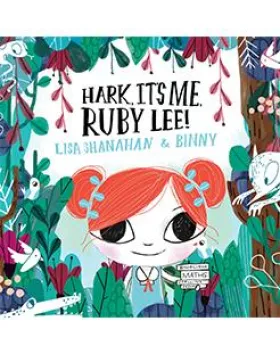
Hark, It’s Me. Ruby Lee! – Lisa Shanahan. Illustrator: Binny Talib
Hark, It's Me. Ruby Lee!
Shortlist year: 2018
Shortlist category: Children's literature
Published by: Hachette Australia
Ruby Lee is a little girl with a very big imagination. Every week Ruby's teacher, Mrs Majestic-Jones, asks special people to do special jobs in her class. Ruby would do anything to be the messenger, as she's the best in her class at announcing. But will her wild imagination get in the way? A delightful story about an adorable and irrepressible heroine from CBCA award-winning author Lisa Shanahan and Illustrators Australia award-winner Binny.
About the author
Lisa Shanahan
Lisa Shanahan is an award-winning writer of picture books and fiction for young people. Some of her well-loved books include Gordon's got a Snookie, Bear and Chook and Daddy's Having a Horse. Her picture book Bear and Chook by the Sea, illustrated by Emma Quay, won the CBCA Book of the Year for Early Childhood in 2010 and BIG PET DAY, illustrated by Gus Gordon, won the Speech Pathology Book of the Year Award for the 5–8 age group in 2015.
About the illustrator
Binny Talib
Binny Talib is an award-winning illustrator and designer whose hand-drawn and playful illustrations can be found widely across the US, UK, Japan and Australia in major children's clothing brands, children's toys, interior design, books, album covers and greeting cards. Her illustration career has flowed on from a design background as an agency art director and creative director and an honours degree in Visual Communications. She is the creator and illustrator of the app Sneaky Sam. Her authorial debut, Origami Heart, was published by Hachette in 2016.
Judges’ comments
Hark, It's Me, Ruby Lee! is an engaging and humorous story, well-constructed and layered with emotional depth, a consummate achievement in a picture book intended for young children. The storytelling is enlightening whilst being lively and playful, with rich vocabulary and child-friendly language. The bold manga-influenced illustrations attract attention and abound in visual jokes.
The child protagonists, Ruby Lee and George Papadopoulos, are deftly crafted in few words: they are fully realised and form empathetic alliances with the reader. Ruby Lee declares that she is the best at announcing 'Hark, it's me, Ruby Lee!' and loves helping, 'humming and hopping and handstands at dusk'. Both the words and the bright over-the-top pictures reflect her exuberant free spirit.
At school, class jobs are allocated on Mondays. Imposing teacher Mrs Majestic-Jones favours the word 'special' and rewards passive, polite behaviour. Her name, majestic appearance and speech contribute to the humour. Ruby Lee is desperate to be the class messenger but her noisy, impetuous actions cause her to be overlooked until her endearing, long-suffering friend, George Papadopoulos, tactfully suggests that she be quiet and still. Ruby Lee is imaginative and loves grand adventures. When she is finally given the messenger role she takes George Papadopoulos across the desert (the sandpit) past the 'Spockled Frocklewockle', over the mountains (the stairs) past the 'Squinker' and through the jungle (the monkey bars) past the 'Shlurgle'. On the first two adventures the message is forgotten or lost and, on the third, Ruby Lee somehow loses George Papadopoulos. The illustrations enhance these whimsical episodes, becoming more luxuriant and fanciful. The humour here is laugh-out-loud.
Friendship is a potent theme and the refrain 'Fear not! I am the bearer of good news!'may prompt the reader to wonder what good news Ruby Lee may be announcing. This is open-ended but there is a clear message about being courageous. Boisterous, creative children will find a kindred spirit in Ruby Lee in this empowering, joyous tale; others will cheer her on and perhaps decide to emulate some of her intrepid, imaginative nature.

Feathers – Phil Cummings and Phil Lesnie
Feathers
Shortlist year: 2018
Shortlist category: Children's literature
Published by: Scholastic Australia
The story reveals the resilience of the human spirit and the universal importance of home and finding safe shelter. This story of compassion and connectivity is more important than ever, given the current global political climate. Themes: birds, migration, geography, refugees, natural disasters, hope, resilience, home, safety.
About the author
Phil Cummings
Award-winning author Phil Cummings was born in Port Broughton and grew up in the mid-north town of Peterborough in South Australia. The youngest of eight children, he has worked as an apprentice mechanic, a waiter and more recently a primary school teacher. He has published more than 60 books for young readers since his first picture book. Recently, Ride Ricardo, Ride was named an Honour Book by the CBCA, 2016.
About the author
Phil Lesnie
Phil Lesnie is a Sydney-based illustrator of children's books. He is also a children's bookseller. It's almost as if he likes books or something. He works primarily in watercolour because even mistakes look lovely in watercolour.
Judges’ comments
Feathers provides a literal bird's-eye view of world events as the reader follows the migratory journey of a sandpiper, from East Asia to Australia. Taking flight from its seaside location in the chill of autumn, the sandpiper journeys across many borders and over many lands, witnessing much hardship along the way—an earthquake ravished town, refugees fleeing from their homeland, a flooded village. The sandpiper drops a feather in each of these troubled places, and when it is plucked up, it provides a moment of wonder, joy and respite from the tragedy of the people's lives. Finally the sandpiper travels across a stormy sea and arrives 'near Mia's house', presumably in Australia, where it settles at the water's edge, 'safe and warm'. The bird's journey illuminates the plight of different peoples across the planet and, in doing so, highlights how relatively lucky Mia and her family are in Australia, but also works to explore human commonality and connection.
In this beautifully crafted book, text and illustration combine to create a thought-provoking and evocative tale that speaks to the world as we know it. The text is spare, elegant and dispassionate and the watercolour illustrations stunningly beautiful and intensely moving. The symbolism of the bird and the feather is subtle but effective and the reader is left with a broad view of humankind and an opportunity to reflect on wonder, hope and gratefulness.
Young adult literature
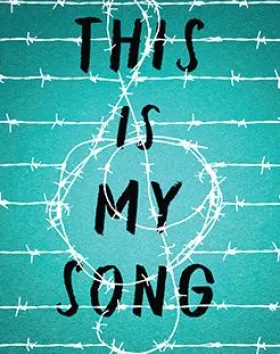
WINNER: This Is My Song – Richard Yaxley
This Is My Song
WINNER
Shortlist year: 2018
Shortlist category: Young adult literature
Published by: Scholastic Australia
In the 1940s, musician Rafael Ullmann is sent to a Nazi concentration camp. In the 1970s, Annie Ullmann lives a lonely life on a Canadian prairie. Three decades later, in Australia, Joe Hawker is uncertain about himself and his future—until he discovers a song, written by his grandfather many years ago. This is my Song crosses three continents and time-lines, and charts the need for each of us to find our own music—and sing that music with conviction and grace to those whom we most love.
About the author
Richard Yaxley
Richard Yaxley has written novels for adults and young adults, plays, poetry, school musicals and many books for the classroom. His verse novel Drink the Air won the 2010 Queensland Premier's Literary Award for Young Adult Fiction. He lives and teaches in Brisbane, Australia.
Judges’ comments
In this rich, beautifully written and multi-layered novel, we follow three generations of the one family and travel between three continents. Rafael Ullman, an aspiring musician born in Bamberg, in Bavaria, is little more than a child when he is sent to a Nazi concentration camp. He survives this horrific experience, in part by his musical ability. Following the war he moves to the wilds of Canada with his wife and daughter and later joins his daughter and grandson in Australia.
These different settings become almost characters themselves with the cold and privation of Auschwitz affecting the actions and interactions of the characters there. The vastness and loneliness of the Canadian landscape isolates the family and provides a kind of protection from the outside world. In Canada Annie, Rafael's daughter, befriends a goshawk which becomes an important character and a symbol of friendship and flight. The heat of Brisbane contrasts strongly with the previous settings and reflects the greater freedom Raphael's grandson has in comparison to his mother or grandfather at the same age.
All the characters are beautifully and convincingly drawn such as Rafael's poor, deluded father who believes until it is far too late that his admiration for Rilke will be shared by the Nazis and will protect him. Rafael's mother tries to cling to normality in Auschwitz by carrying out Jewish rituals as best she can. There are many other people who move in and out of the lives of the main characters, adding a richness and depth to the narrative.
Each section of the book is told by one of the family—Rafael, Annie and finally grandson Joe. Each narrative voice is authentic and utterly convincing. The triptych structure allows the reader to understand more about each character than they, or their family do. The horrifying revelation, which comes as such a shock to Annie and Joe after Rafael's death has already been disclosed to the reader who is in a privileged position as onlooker. The music that allowed Rafael to survive becomes part of the burden of guilt he carries as a survivor and he won't permit music in his home. After his death, however, in a beautifully crafted and deeply touching moment, the story comes full circle. His grandson finds a yellowed sheet of paper with music written by a man the reader knows to have been Rafael's first music teacher and lyrics by Rafael himself, which Joe sings in a music competition.
There have been, of course, many novels about the Holocaust, including ones for younger readers. This book explores the way the terrible events of the Holocaust affect the generations following, sometimes in ways even they don't understand. This is My Song also explores the damage that secrets can do. It is poignant, memorable and intensely moving.
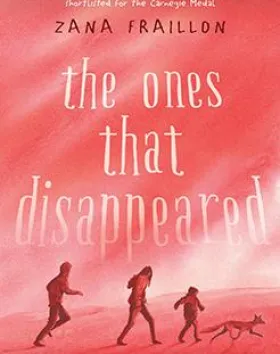
the ones that disappeared – Zana Fraillon
the ones that disappeared
Shortlist year: 2018
Shortlist category: Young adult literature
Published by: Hachette Australia
Around the world, millions of people—including many children—are victims of human trafficking. These modern-day slaves often go unseen even in our own cities and towns, their voices silent and their stories untold. In this incredible book, Zana Fraillon imagines the story of three such children, Esra, Miran and Isa. The result is powerful, heartbreaking and unforgettable. This is a Skellig for this generation; beautiful, magical and with Zana Fraillon's incredible talent for combining important global issues with extraordinary storytelling.
About the author
Zana Fraillon
Zana Fraillon was born in Melbourne, but spent her early childhood in San Francisco. Her 2016 novel The Bone Sparrow won the ABIA Book of the Year for Older Children, the Readings Young Adult Book Prize and the Amnesty CILIP Honour. It was also shortlisted for the Prime Minister's Literary Awards, the Queensland Literary Awards, the Guardian Children's Fiction Prize, the Gold Inky and the CILIP Carnegie Medal. She spent a year in China teaching English. When Zana isn't reading or writing, she likes to explore the museums and hidden passageways scattered across Melbourne.
Judges’ comments
Esra, Miran and Isa each bear the tattoo of the Snakeskin Gang on their wrists—a mark that identifies them as the property of the cruel and manipulative Orlando. They work for Orlando in The Jungle: the basement of a suburban house, where marijuana plants are cultivated for the drug trade. Theirs is a world of enslavement, deprivation, violence and constant fear. But despite their dire circumstance, the children never give up hope that one day they will follow the river and return home. Esra whispers her truth each night, Miran tells riddles and Tomorrow Stories and Isa holds dear the last words of his abbi: 'the tears of a bull will set you free'. During the aftermath of a fire in the basement, the children seize the opportunity to escape—but can they ever truly be free?
Skilfully told through three unique perspectives, the tale that Zana Fraillon weaves is harrowing and confronting, yet also poignant and thought provoking. Rich with symbolism and with a magical realism element threaded through the narrative arc, the work is much more than a study of the brutal world of human trafficking and child slavery. Rather, it is an ode to hope, the right to freedom and the resilience and resourcefulness of the human spirit. Motifs of the river, fox and white pigeon are particularly strong, as too is the exploration of the importance of story and the meaning of 'home'.
With prose that is lyrical, original and at times poetic, and with characters that leap from the page, the reader is lured into the disturbing world of these determined and fiercely loyal children and is rewarded with a story that is powerful and deeply affecting.

ruben – Bruce Whatley
ruben
Shortlist year: 2018
Shortlist category: Young adult literature
Published by: Scholastic Australia
Ruben's dreams were of places that made no sense to him. Places that didn't exist. At least not anymore. Ruben lives in a safe place in a city that takes everything and gives nothing back. He begins to feel that he is in danger and ventures to Block City where he meets Koji. She too has been hiding from the dangers of the industrial city and its excesses. Ruben and Koji realise that if they combine their knowledge of how the city works they can find a way to escape. Ruben is a triumph of Whatley's imaginative and technical skills.
About the author
Bruce Whatley
Bruce Whatley has produced some of the most popular and awarded books in Australia, including The Ugliest Dog in the World and Diary of a Wombat, his best-selling collaboration with Jackie French. He has illustrated more than 40 books, including several co-written with Rosie Smith.
Judges’ comments
Ruben is an extended picture book for a sophisticated readership. It is an extraordinary work of complexity and vulnerability. Diagonal lines denote turmoil and unease from our first meeting with young Ruben who lives alone in his safe place surrounded by things he has collected. 'Broken things. Forgotten things. Things he needed to survive'. Outside is a devastated, decaying, futuristic dystopian setting, perhaps redolent of the 1927 science-fiction film, Metropolis, illustrated in monochromatic graphite and composed of framed and unframed spreads, panel strips and vignettes. Ruben scavenges for forgotten relics in Block City, an industrial maze of machines, cogs and conveyor belts depicted with precise technical detail. Viaducts carry giant trains with endless supplies and fuel for the faceless few in the city's upper levels. The shadows offer safety but also conceal scurrying things. Chiaroscuro rendering of shadows and the light of fireflies evoke contrasting moods but the traditional use of light to represent goodness and hope is subverted when the Controllers, robotic human figures who make senseless decisions, follow glowing globes. Their light is a threat.
Tension increases as Ruben risks injury and life climbing the train tracks. Guards with listening devices, Monoliths who feed cargo to the furnaces, Bowler Men, Sweepers and the Unknowns are a constant peril. Ruben first sees a small running figure as a dark silhouette. It is a girl, Koji, who he entices with a talismanic toy boat before they share their maps made of paper and mechanised disc. Ruben's body language and facial expressions metamorphose from sorrow and defeat to uncertain elation and protectiveness in his encounter with another human child.
Sirens screech in a scene intimating Nazi book burning when Ruben snatches a book dropped by a Monolith. The children escape by climbing the cogs to Koji's secret safe place, together becoming part of 'the space between things'. Once there Koji distances herself, shown by her turned back and retreat into the spaces in between, so Ruben returns to his own, now unsafe, place. Like Ruben and Koji, homeless, displaced children need a symbolic or other key to safety and protection. This multifaceted, allusive work suggests that books and their power to elicit imagination and knowledge may offer solace and strength and even signify a way forward. An open-ended epilogue maintains the sense of disquiet but implies that a hopeful, fairy tale resolution may be possible for some lost children. This is a masterful work.
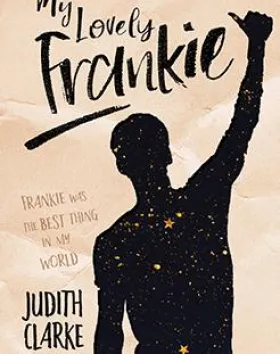
My Lovely Frankie – Judith Clarke
My Lovely Frankie
Shortlist year: 2018
Shortlist category: Young adult literature
Published by: Allen & Unwin
A masterful, moving story about a boy caught between faith and love, by one of Australia's finest writers. In the 1950s, 'entering' the seminary was for ever, and young boys were gathered into the priesthood before they were old enough to know what they would lose. Tom went to St Finbar's because he was looking for something more than the ordinary happiness of his home and school. But then he discovered that being able to love another person was the most important thing of all. For Tom, loving Frankie made him part of the world. Even when Frankie was gone...
About the author
Judith Clarke
Judith Clarke is major force in young adult fiction both in Australia and internationally. Her novels include the multi-award-winning Wolf on the Fold, as well as the very popular and funny Al Capsella series. Kalpana's Dream was named an Honor Book in the prestigious Boston Globe/Horn Book Awards and One Whole and Perfect Day was an Honor Book in the American Library Association's prestigious Michael L. Printz Awards for Excellence in Young Adult Literature. The Winds of Heaven was named an Honour Book in the 2010 CBCA Book of the Year awards and shortlisted for the inaugural Prime Minister's Literary Award.
Judges’ comments
This is a literary work and one where the emotions stirred by it are likely to reverberate with the reader long after the last page has been turned. The story is crafted in first person as Tom Rowland, a retired priest, recalls his time as a 16-year-old novice at St Finbar's Seminary in the 1950s. Here he met the charismatic Frankie Maguire, who would influence his life, forever. The title—My Lovely Frankie—aptly encapsulates Tom's deep love for Frankie as well as Frankie's warmth, power and joie de vivre. Free-spirited Frankie is imbued with love, which he shares unaffectedly within his 'lovely, lovely' world. The antagonist, a kind of Iago figure, is Brian Cooley, known as Etta, an epithet derived from the corrupted reverse spelling of Hate. He is the appointed Head Prefect of the seminary, a willing disciple of the cruelty and punishment dealt out by the Rector. He is also infatuated with Frankie but in a jealous and voyeuristic way. Etta is the oppositional character who changes the courses of the lives of both Frankie and Tom and who may well have been the last person to see Frankie before he disappeared.
Father Tom's recollections are, while drawn through the veil of an ageing memory, reflective and nostalgic and highlight the tragic events of the past while also allowing the reader to understand Tom's loyalty and devotion to the memory of Frankie. Tom's voice as his sixteen-year-old self, suggests a thoughtful, even intellectual, boy grappling with the enormous changes in his life once he has entered the seminary. The writing is lyrical and beautiful, powerfully conveying all the turmoil of the loneliness, fear of punishment, and neglect the boys experience as well as the strength of their friendships. Ultimately though, this is a story of love and self-discovery, faith and commitment.

Living on Hope Street – Demet Divaroren
Living on Hope Street
Shortlist year: 2018
Shortlist category: Young adult literature
Published by: Allen & Unwin
We all love someone. We all fear something. Sometimes they live right next door—or even closer. On this street, everyone comes from different places, but to find peace they will have to discover what unites them. A deeply moving, unflinching portrait of modern Australian suburban life.
About the author
Demet Divaroren
Demet Divaroren is the co-editor of the CBCA short-listed Coming of Age: Growing up Muslim in Australia. Demet was born in Adana, Turkey, and migrated to Australia with her family when she was six months old. She teaches creative writing at TAFE and writes fiction and non-fiction exploring life, love and the complexities of human emotions.
Judges’ comments
In this powerful debut novel, Demet Divaroren authentically portrays the everyday lives of a number of working class families as they come to terms with a range of challenging contemporary issues in a suburban street. Each of the central characters is richly drawn as they share their individual stories. Kane, his mother Angie and younger brother Sam are living with increasingly terrifying domestic violence. The depth of Kane's anger demonstrates how they are faced with the very real possibility of its intergenerational repetition. Fortunately this family is not alone—their neighbour Mrs Aslan is always there to love and support them despite her own grief and loss. Her estranged granddaughter Ada is at odds with her mother as she searches for her own identity. Newly arrived refugee Gugulethu and her family are leaving past trauma behind and adapting to a new culture. At the same time they find joy in their new life and extend the hand of friendship.
Nearby war veteran Mr Bailey struggles with racism and the demons from his own war experiences. Several times the same incidents are retold through the eyes of different characters, these expertly crafted voices enabling the reader to understand and empathise with multiple perspectives. Each voice is authentic—the reader can feel Sam's fear and increasing sense of isolation both at home and school and bemoan Mrs Aslan's despair at her daughter's rejection. As the novel unfolds, these separate stories are skilfully interwoven and the community grows together, finally galvanising into action when called upon.
Living on Hope Street is an honest and thought-provoking celebration of human courage and resilience; the importance of family and friendship; the need to build intercultural understandings; and the hopefulness that can foster new beginnings.
Non-fiction
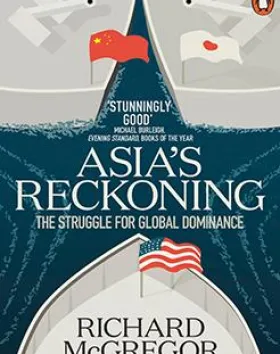
WINNER: Asia’s Reckoning – Richard McGregor
Asia's Reckoning
WINNER
Shortlist year: 2018
Shortlist category: Non-fiction
Published by: Penguin Random House UK
For more than half a century, American power in the Pacific has successfully kept the peace. But it has also cemented the tensions in the toxic rivalry between China and Japan, consumed with endless history wars and entrenched political dynasties. Now, the combination of these forces with Donald Trump's unpredictable impulses and disdain for America's old alliances threatens to upend the region. If the United States helped lay the post-war foundations for modern Asia, Asia's Reckoning reveals how that structure is now crumbling.
About the author
Richard McGregor
Author of the acclaimed bestseller The Party: The Secret World of China's Communist Rulers, Richard McGregor has reported from Asia for two decades. Formerly Chief of the Washington Bureau of the Financial Times, he has won numerous awards for his journalism. He has also contributed articles and reports to the BBC, the International Herald Tribune and the Far Eastern Economic Review. In 2015 he was made a Fellow at the Wilson Center in Washington.
Judges' comments
Asia's Reckoning is an important, ground breaking book that will stand the test of time. This is set to become the definitive text on this subject. McGregor draws on his experience as an Asian correspondent and this book reveals his tremendous depth of knowledge and experience in China, Japan and the United States of America. This is an intriguing slice of history, which has never been written before. Importantly this work is the view of an Australian looking out to the world and McGregor brings an ethnographic, insider/ outsider perspective. The book is beautifully researched with the small observances as important as the grander themes of this book. It provides unique observations on how these cultures operate. Asia's Reckoning is a beautifully composed book that everyone should read.

Unbreakable – Jelena Dokic and Jessica Halloran
Unbreakable
Shortlist year: 2018
Shortlist category: Non-fiction
Published by: Penguin Random House
This is a story of Jelena Dokic's survival. How she survived as a refugee, twice. How she survived on the tennis court to become World No. 4. But, most importantly, how she survived her father, Damir Dokic, the tennis dad from hell. From war-torn Yugoslavia to Sydney to Wimbledon, she narrates her hellish ascent to becoming one of the best tennis players in the women's game, and her heart-breaking fall from the top. Her gutsy honesty will leave you in awe. Her fight back from darkness will uplift you. Most of all, Jelena's will to survive will inspire you.
About the author
Jelena Dokic
At 17 Jelena Dokic reached the semi-finals at Wimbledon. By September 2000 she became an Olympian and finished fourth at the Sydney Games. By 19, she was World No. 4 and World No. 9 in doubles. She won her first Women's Tennis Association (WTA) singles title at the Rome Masters in May 2001. She was also a French Open doubles finalist the same year. Injury prematurely finished her tennis career in 2013. She has worked as a commentator on Fox Sports News and Channel Seven's tennis coverage. She lives in Melbourne with her partner Tin.
About the author
Jessica Halloran
Jessica Halloran started her journalism career as a cadet at the Sydney Morning Herald and now covers sport for the Sunday Telegraph. She has reported from events including Olympics, Commonwealth Games, Australian Opens, NRL and AFL finals series and interviewed the world's biggest sports stars. She covered Jelena Dokic's incredible comeback at the 2009 Australian Open. Her first profile of Jelena saw Jessica win an Australian Sports Commission award for best sports feature writing. Jessica has also been a Walkley Award and Kennedy Award finalist. She lives in Sydney with her husband and their two children.
Judges’ comments
This is an unusual memoir that stands out because it is a story Australians thought we knew but did not. While this is a traumatic story, it is remarkably not pessimistic. Unbreakable shows us that Jelena Dokic should not merely be remembered for her place in Australian sport, but also as a successful young Australian woman who was abused in front of our eyes, yet we as nation failed to act on this or indeed call it out. Family abuse is a current social issue and this memoir explores the systemic problem of a parent living through a child in the competitive world of sport. As an account of that kind of family abuse, it is riveting. This book is surprising. It is not your usual sports biography, but a shocking and unrelenting account of her trauma. There is a lot to learn as Dokic demonstrates how truly unbreakable she is.
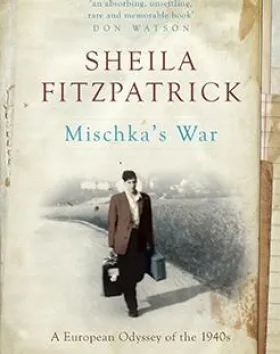
Mischka’s War: a European Odyssey of the 1940s – Sheila Fitzpatrick
Mischka's War: a European Odyssey of the 1940s
Shortlist year: 2018
Shortlist category: Non-fiction
Published by: Melbourne University Publishing
In 1943, Mischka Danos witnessed a terrible sight in the Latvian woods—a pit filled with Jews killed by the Germans. Mischka escaped conscription to the Waffen-SS by going on exchange to Germany and later discovered he was part-Jewish. His was no ordinary life. He escaped death in the firebombing of Dresden. He lived in occupied Germany before reuniting with his mother in Denmark. He was a member of the Heidelberg school of physics. Resettled in the US, he fell in love with and married Sheila Fitzpatrick. Fitzpatrick pieces together her late husband's story through diaries, correspondence and recollections.
About the author
Sheila Fitzpatrick
Sheila Fitzpatrick is Professor of History at the University of Sydney and Distinguished Service Professor Emerita of the University of Chicago. Mischka's War is the third in her series of memoirs, including My Father's Daughter (2010) and A Spy in the Archives (2013). She has written many books on Soviet history, including On Stalin's Team: The Years of Living Dangerously in Soviet Politics, which was joint winner of the 2016 Prime Minister's Literary Award for Non-Fiction.
Judges’ comments
Sheila Fitzpatrick is a prolific historian; however, Mischka's War does not present what you would expected from an Australian academic. Rather this is a complex and intriguing story, presenting a personal journey of discovery through an intimate biography while revealing the complexities of European cultures in the 1940's. Fitzpatrick has approached the story from a lively yet subtle perspective, it is personal and yet not indulgent. This is the skill of the author as she brings her historian's eye and objectivity to a deeply personal story about her late husband's family. She is rigorously careful about the detail. Mischka's War is humane and polished providing an appreciation of the complexities of Eastern Europe at the time.
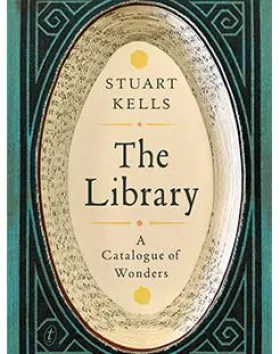
The Library: A Catalogue of Wonders – Stuart Kells
The Library: A Catalogue of Wonders
Shortlist year: 2018
Shortlist category: Non-fiction
Published by: Text Publishing
Libraries are filled with magic. From the Bodleian, the Folger and the Smithsonian to the fabled libraries of middle earth, Umberto Eco's mediaeval library labyrinth and libraries dreamed up by John Donne, Jorge Luis Borges and Carlos Ruiz Zafón. Stuart Kells explores the bookish places, real and fictitious, that continue to capture our imaginations. The Library: A Catalogue of Wonders is a fascinating and engaging exploration of libraries as places of beauty and wonder. It's a celebration of books as objects and an account of the deeply personal nature of these hallowed spaces by one of Australia's leading bibliophiles.
About the author
Stuart Kells
Stuart Kells is an author and book-trade historian. His 2015 book, Penguin and the Lane Brothers, won the Ashurst Business Literature Prize. An authority on rare books, he has written and published on many aspects of print culture and the book world. Kells lives in Melbourne with his family. His most recent publication is Shakespeare's Library.
Judges’ comments
This is a beautifully written account demonstrating that the library truly is a catalogue of wonders. A book that will appeal far more broadly than just to bibliophiles. This is a book for readers, for lovers of libraries and for those who like to think about knowledge and how it is conveyed across the years. Kells has given gravitas to the very first libraries as he ponders the rich archival nature of stories and culture provided in Australian Indigenous song lines. Kells skilfully illustrates how important knowledge, books, archives and the narratives these contain are for understanding human history.
Elegantly written The Library is both delightful and charming.
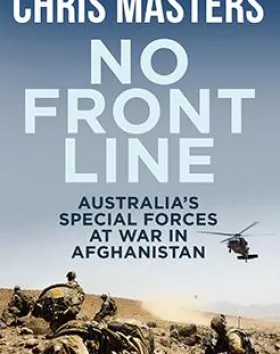
No Front Line: Australia’s Special Forces at War in Afghanistan – Chris Masters
No Front Line: Australia's Special Forces at War in Afghanistan
Shortlist year: 2018
Shortlist category: Non-fiction
Published by: Allen & Unwin
In an extraordinary investigation undertaken over 10 years, Chris Masters opens up the heart of Australia's Special Forces and their war in Afghanistan. He gives voice to the soldiers, he takes us to the centre of some of the fiercest combat Australia has ever experienced and provides the most intimate examination of what it is like to be a member of this country's elite fighting forces. But he also asks difficult questions that reveal controversial clouds hanging over our Special Operations mission in Afghanistan.
About the author
Chris Masters
Chris Masters is a powerful force in Australian journalism. In 1985, he won Australia's most prestigious award in journalism, the Gold Walkley, for his Four Corners report on the sinking of the Rainbow Warrior. His reports The Big League and The Moonlight State both led to royal commissions that helped transform the nation. He is the author of the bestselling Jonestown (2006). His most recent book is the critically acclaimed Uncommon Soldier.
Judges’ comments
This is a meticulously researched book that for the first time offers a comprehensive account of Australia's special forces' role in Afghanistan. Chris Masters brings his experience as one of our best-known investigative journalists to the complex task of recording recent military history. The book is a result of a decade of field work and draws on official documentation as well as extensive interviews with servicemen and their families to present a compelling mix of military and personal history. No Front Line reveals much about Australian culture as it focuses in detail on the operations in the Afghan conflict. Masters has a spare writing style but still manages to get inside the minds and culture of the people on the ground: this is an account of the psychological as well as the physical terrain that our special forces confronted in Afghanistan. For many Australians, the operations of this war have been distant and unknown. Masters' detailed book tells an important story of modern warfare. This was undoubtedly a difficult book to write but the author navigates complex material with authority and humanity to present a serious and balanced account.


